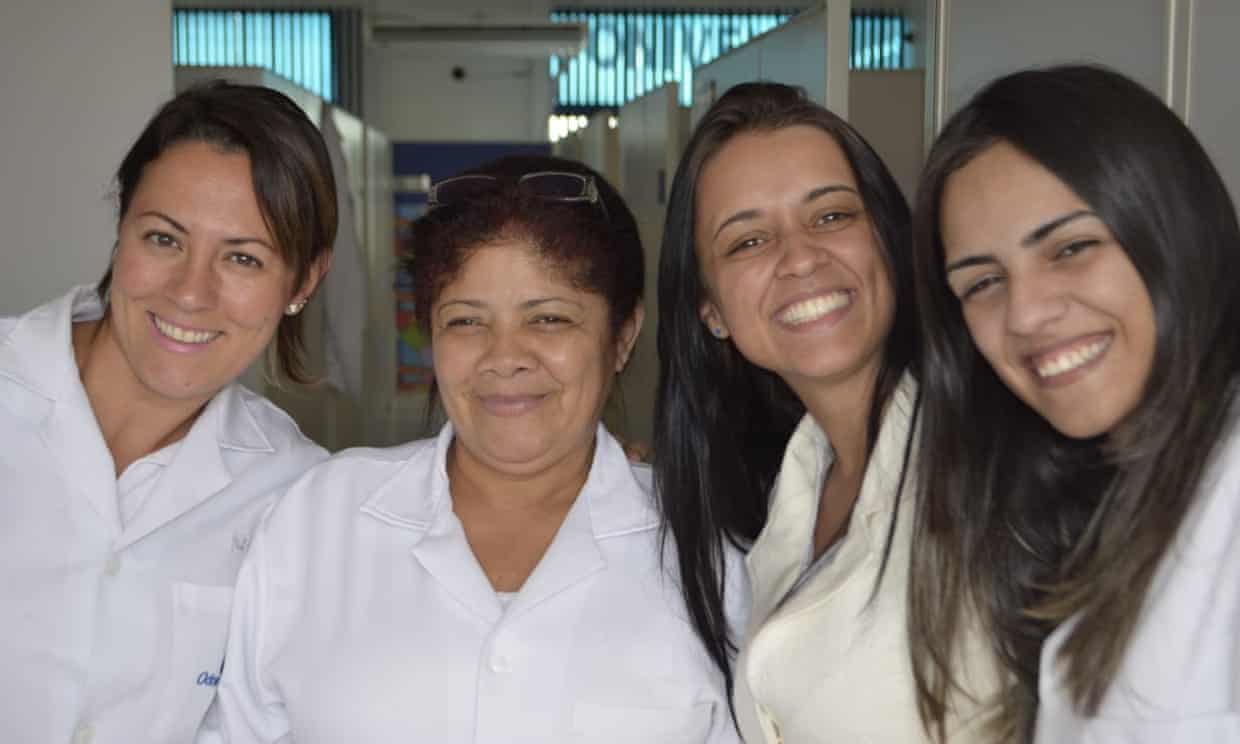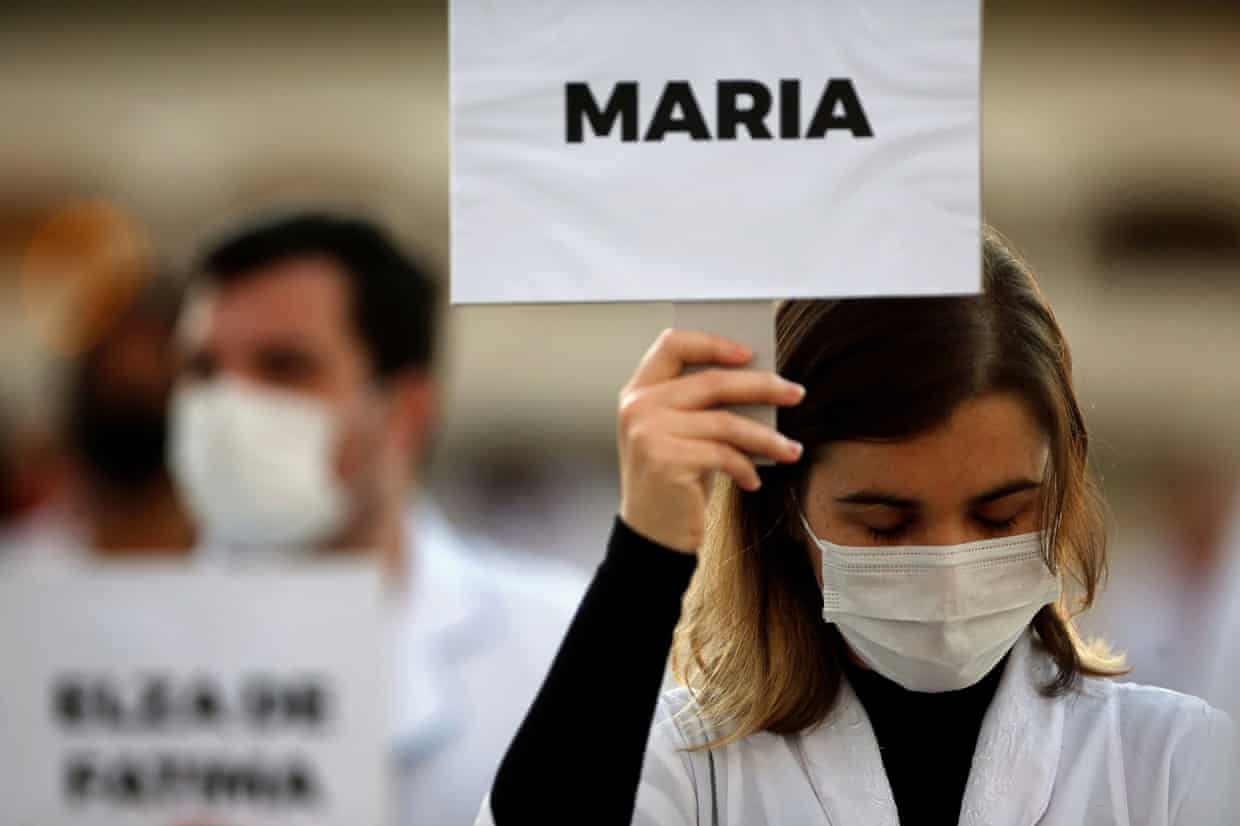
Coronavirus outbreak
'My mother was murdered': how Covid-19 stalks Brazil's nurses
More nurses – 157 – are thought to have died in Brazil than anywhere else, while Bolsonaro and his supporters continue to downplay the crisis
by Caio Barretto Briso, Tom PhillipsAt the casualty department where she worked on the outskirts of São Paulo, Maria Aparecida Duarte was the nurse everyone loved, known for her dedication, her jokes and her smile.
But as the coronavirus pandemic swept through Brazil, claiming hundreds and then thousands of lives, the 63-year-old’s mood began to sour.
Four colleagues had died; countless were off sick. More than fear, Duarte felt resignation: she was certain she would be next.
On 10 April those premonitions were confirmed. Twenty-four hours after her last shift at the casualty ward in Carapicuíba, Duarte was admitted to hospital with Covid-19 symptoms and put on a ventilator.
Over the coming days two of her four children would join her in the intensive care unit for treatment. They all made it out, but their mother died on 3 May.
“She was the backbone of the family, the great matriarch,” said her daughter, Andreza Reina, who blames her mother’s government employers for requiring her to keep working but failing to equip her with adequate personal protective equipment (PPE).
Duarte, 34, claimed her mother, who had diabetes and high blood pressure, had worn a paper-thin cap to work and had to make her own face mask from a piece of cloth.
“She shouldn’t have been working on the frontline. My mother was murdered.”
Duarte is one of at least 157 Brazilian nurses who have died since the country’s first confirmed Covid-19 fatality in mid-March.
According to the International Council of Nurses (ICN) that means more nurses have died in Brazil than anywhere else on earth – including other coronavirus hotspots such as the US, where at least 146 have died, and the UK where the number is at least 77.
More than half of those fatalities have taken place in the south-eastern states of Rio de Janeiro and São Paulo where a combined total of over 10,000 people have died.
But nurses are losing their lives across the country, with at least 23 deaths in the north-eastern state of Pernambuco and 10 in Amazonas state, another hotspot.
In the capital of Amazonas, Manaus – where the soaring death toll has forced authorities to dig mass graves – Deizeane Romão is mourning her husband, a 46-year-old nurse named Nicolares Curico who died on 14 April.
“Take care of our daughters. I love them,” he wrote in a message to his wife before being admitted to intensive care a week before his death.
Romão said her husband had also loved his profession: “It wasn’t about the money – his salary was less than 2,000 reais (£600) per month.”
But a lack of PPE and staff, because so many colleagues were falling ill, had left him overworked and exposed.
“He felt unprotected because he didn’t have an N95 mask,” Romão said. “He was seeing more than 100 patients a day.”

Manoel Neri, the president of Brazil’s federal council of nursing, said nurses were the hidden heroes of Brazil’s fight against the pandemic, which has also killed at least 114 doctors.
“There’s a huge gulf between the way nursing teams and medical teams are treated and the recognition they receive. But they are all on the frontline,” Neri said.
A recent Brazilian television report showed that at one Covid-19 field hospital in Rio air-conditioned rooms with beds had been prepared for doctors while nurses slept on mattresses on the floor.
“Doctors are treated like heroes but our nurses are forgotten,” Neri complained, accusing successive governments both leftwing and right of neglecting their demands for improved salaries and working conditions.
Howard Catton, head of the ICN, said: “[Nurses] are one of our most precious resources. If somebody is being forced to go to work without proper training and with no PPE, then a criminal investigation is required.”
Such are the hardships facing Brazilian nurses that many must moonlight. Tcharlyson de Freitas Ribeiro, a 26-year-old nurse from the Amazon city of Boa Vista, works part-time as an Uber driver in order to support his son and pregnant wife.
“Since the pandemic started I’ve had to stop driving to avoid the risk of exposing my passengers to the virus,” said Ribeiro, who is currently treating more than 50 Covid-19 patients at his hospital.
Recent weeks have seen nurses mobilise to highlight such difficulties and remember the dead. On 1 May a group gathered in silence outside the presidential palace in face masks and white jackets – only to be set on by radical supporters of the president, Jair Bolsonaro, who has flouted social distancing and failed to visit frontline health workers.

“They called us every name you can imagine – things that didn’t even make sense,” said Ana Catarine Carneiro, a Brasília-based nurse who said the Bolsonaristas had even accused the group of “genocide”.
“How can health professionals be genocidal?” asked Carneiro, a director at the city’s nursing union.
Carneiro said she had felt most stunned at being accused of fabricating coronavirus deaths by Bolsonaro’s followers, apparently as part of a leftwing plot against Brazil’s far-right president.
“It hurt me profoundly to hear them denying the deaths – because I think it’s just absurdly disrespectful to those who passed away and their families and friends,” she said.
There is nothing fabricated about the death of Curico, whose four-year-old daughter has yet to understand why he has not come home. “My days are so sad with him gone. I’ve no one to talk to. I can no longer smile,” said Romão, widowed aged 33.
Andreza Reina, the youngest of Duarte’s four children, has been taking sedatives and antidepressants to deal with the loss of her mother, whom friends knew simply as Cidinha. “For the country my mum is just another number,” she said.
“For me she was the most important person in the world.”